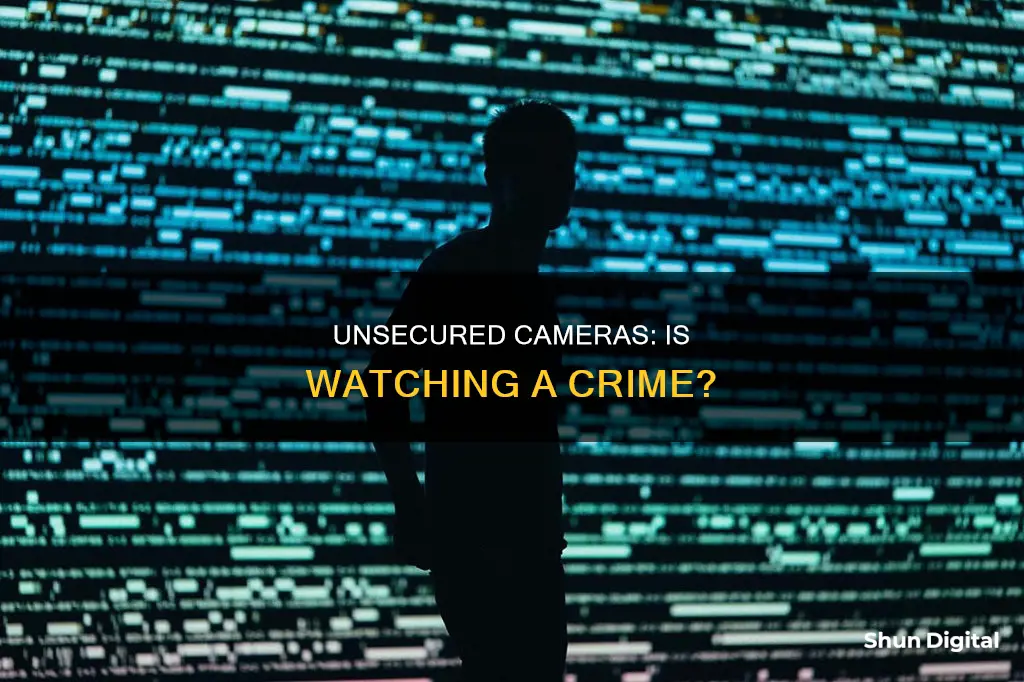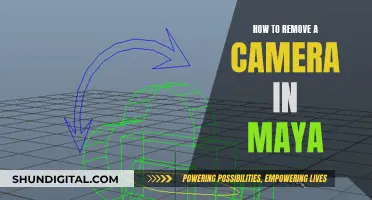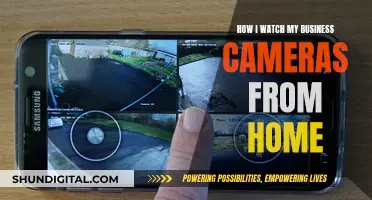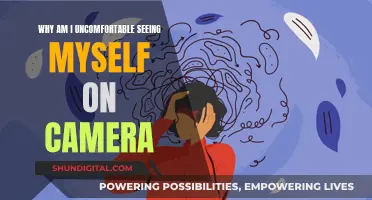
The internet has made it possible to access unsecured cameras, and websites have been created to make this even easier. Insecam, for example, claims to be the world's biggest directory of online surveillance security cameras, with 11,000 in the US alone. These cameras are often easily accessible due to a lack of security or weak passwords. While it may be legal to view these streams in some countries, it is illegal in others. In the US, for instance, accessing these streams is considered a violation of the Computer Fraud and Abuse Act. In the UK, it would likely fall under unauthorised access to computer material in the Computer Misuse Act. To avoid unintentionally accessing unsecured cameras, it is recommended to secure your own cameras with strong passwords and to cover your computer's webcam when not in use.
| Characteristics | Values |
|---|---|
| Is it illegal? | In most countries, it is illegal to access an unsecured camera. |
| Examples of laws | Computer Misuse Act (UK), Computer Fraud and Abuse Act (US) |
| Fix for camera owners | Set a password for the camera |
| Fix for viewers | Cover your camera with a plaster or buy a webcam cover |
What You'll Learn

Unauthorised access to computer material
The Computer Misuse Act 1990 (CMA 1990) in the UK covers the offence of unauthorised access to computer material. This law states that a person is guilty of an offence if they cause a computer to perform any function with the intent to secure access to any program or data held in any computer, or to enable any such access to be secured. The law also applies if an employee uses their own devices to access unauthorised information at work.
The CMA 1990 defines unauthorised access as occurring when:
- The person intends to gain unauthorised access and knows that this is the case. Whether this is achieved is irrelevant.
- The person acts with recklessness or carelessness in accessing the information.
- The person physically or remotely accesses a computer and causes it to perform a function to give unauthorised access.
The CMA 1990 also covers situations where an employee is authorised to access certain information but uses it for an unauthorised purpose, such as for private work or research. In such cases, the employer should clearly define the limits of the employee's authority to access specific programs or data.
The maximum penalty for unauthorised access to computer material under the CMA 1990 is two years' imprisonment and/or a fine.
Viewing Hikvision Cameras on PC: A Simple Guide
You may want to see also

Default passwords
To secure your camera, it is important to change the default password to a secure password, preferably one with two-step authentication. It is also recommended to use a different password for each device and to regularly update the camera's firmware.
In addition to password protection, there are other steps that can be taken to secure your camera. For example, avoiding installing cameras in private spaces such as bedrooms or bathrooms, and disabling the camera and microphone when they are not in use. It is also important to purchase cameras from reputable brands that offer continuous technical support and update packages for their firmware.
While watching unsecured cameras is not illegal in many places, it is still an invasion of privacy. It is important to be aware of the risks associated with unsecured cameras and to take steps to secure your devices.
A Guide to Operating HD IR Camera Watches
You may want to see also

Privacy laws
Federal Laws
The Federal Wiretap Act prohibits intercepting or recording oral communications without the consent of all parties. This means that security cameras with audio functions must be used with caution, and proper signage should be displayed to notify those who may be recorded. Additionally, the Fourth Amendment protects against unwarranted government searches of private property, meaning that law enforcement cannot demand footage from private home surveillance systems without cause and warrants.
State and Local Laws
State and local laws can vary significantly, and it is essential to refer to the specific regulations in your area. Some states have stricter security camera laws than what is permitted at the federal level. For example, California has strict consent requirements for any audio recording and prohibits recording in private settings without consent. Other states, like Florida, Illinois, and Maryland, also have specific consent requirements for audio recording.
Expectation of Privacy
At the core of privacy laws is the concept of a "reasonable expectation of privacy." Individuals have the right to privacy in certain places, such as bathrooms, bedrooms, and changing rooms. Security cameras, whether hidden or not, cannot be placed in these areas without violating privacy laws. Outdoor security cameras should also be positioned carefully to avoid capturing footage of neighbours' properties or invading their privacy in any way.
Consent Laws
Consent laws vary depending on the location. In some states, there is a one-party consent policy, which means that only one person needs to consent to the recording. In other states, a two-party consent policy is in place, requiring the consent of everyone in the frame of the camera.
Implications of Violating Privacy Laws
Violating privacy laws can result in serious consequences, including lawsuits, fines, and even imprisonment, depending on the state and circumstances. It is crucial to respect others' privacy, comply with surveillance regulations, and seek legal advice when necessary to ensure that your security measures do not infringe on the rights of others.
Pairing Apple Watch with Camera: A Simple Guide
You may want to see also

Online security
The online world has opened up a new avenue for security threats, with unsecured cameras being one of the most significant concerns. The issue of unsecured cameras has raised questions about the legality of accessing and streaming footage from these devices. While the law varies across different countries, it is generally considered illegal to access unsecured cameras without authorization. This is often classified as "unauthorized access to computer material" or "computer fraud and abuse".
To protect yourself from such invasions of privacy, it is crucial to secure your cameras and online presence. Here are some measures you can take:
- Passwords: Use strong passwords for your cameras and other online accounts. Avoid default passwords set by the manufacturer, as they are easily accessible and can be exploited. Set unique passwords that are complex and difficult to guess.
- Two-Factor Authentication (2FA): Enable 2FA wherever possible. This adds an extra layer of security, requiring something you know (a password) and something you have (a code sent to your phone or email).
- Regular Updates: Keep your devices, drivers, and applications up to date with the latest security patches. Manufacturers often release updates to fix vulnerabilities, so staying updated helps protect your system.
- Firewalls and Security Software: Install reputable firewalls and anti-malware software to monitor and block unauthorized access attempts.
- Camera Covers: For added privacy, use physical covers for your webcams when not in use. This ensures that even if your camera is accessed, your privacy is maintained.
- Secure Networks: When connecting your IP cameras to a network, ensure the network itself is secure. Use secure connections, such as VPN, and avoid public or unsecured Wi-Fi networks that could provide an entry point for malicious actors.
- Camera Positioning: Position your cameras strategically to avoid capturing sensitive or private areas. This is especially important for home security cameras. Avoid pointing cameras directly at windows or areas where private activities may occur.
- User Access Control: Restrict access to your camera feeds. Only authorized users should have the credentials to view or control the cameras. Regularly review and revoke access for anyone who no longer requires it.
- Encryption: Enable encryption for data transmitted by your cameras. This ensures that even if data is intercepted, it cannot be easily deciphered.
- Regular Security Audits: Conduct periodic security audits of your camera systems and networks. Identify vulnerabilities and implement necessary measures to address them.
By implementing these security measures, you can significantly reduce the risk of unauthorized access to your cameras and protect your privacy. It is important to stay vigilant and proactive in securing your online presence, as the consequences of unsecured cameras can range from voyeurism to more severe criminal activities.
Disabling Apple Watch Camera: A Step-by-Step Guide
You may want to see also

IP addresses
There are websites dedicated to cataloguing unsecured security cameras from around the world, allowing anyone to watch the live feeds. These websites, such as Insecam.org and Opentopia, provide easy access to thousands of cameras by simply visiting their websites and browsing their unsecured cameras catalogue. The cameras listed are typically from people's homes, restaurants, venues, and other public places.
To access these unsecured cameras, websites use various methods, including randomly trying default usernames and passwords. If they successfully gain access, they add the camera to their live online list. This process underscores the importance of changing default passwords and usernames during the installation of security cameras.
While accessing unsecured IP cameras may seem like a harmless activity, it is essential to understand the legal implications. In most countries, unauthorised access to a computer system or device is illegal. For example, in the UK, it could fall under "unauthorised access to computer material" in the Computer Misuse Act. Similarly, in the US, it might fall under the Computer Fraud and Abuse Act.
It is worth noting that the legality of viewing unsecured IP cameras can vary depending on the country and specific circumstances. However, as a general rule, it is advisable to refrain from accessing or viewing unsecured cameras without proper authorisation to avoid potential legal consequences.
Simultaneously Viewing Vivint's Dual Cameras: A Step-by-Step Guide
You may want to see also
Frequently asked questions
Watching unsecured cameras is illegal in most countries. In the US and the UK, it is considered "unauthorised access to computer material" and falls under the Computer Misuse Act.
In the US, it is illegal to watch unsecured cameras as it falls under the Computer Fraud and Abuse Act.
In the UK, watching unsecured cameras is considered an offence under section 1 of the Computer Misuse Act.
The consequences of watching unsecured cameras can vary depending on the country and the specific circumstances of the case. In some cases, it may result in prosecution and punishment under the relevant laws.







